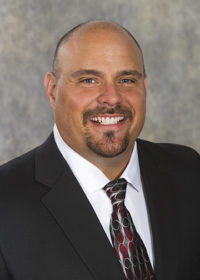
 Aaron Light, DHSc, RRT, RRT-ACCS, FAARC.
Aaron Light, DHSc, RRT, RRT-ACCS, FAARC.The respiratory care profession would not exist without the dedicated therapists who have moved into the educational arena to prepare the next generation of RTs. In addition, as more and more of today’s educators enter retirement, it has never been more critical for therapists on the clinical side to consider a shift into education.But are there opportunities beyond just teaching or directing an RC program? Aaron Light, DHSc, RRT, RRT-ACCS, FAARC, is living proof that therapists who start in the classroom can move up the academic ladder. Now dean of health sciences at Ozarks Technical Community College in Springfield, MO, he has done just that.
In this interview, Dr. Light shares his journey from RT student to the college dean.
How long have you been an RT, and what initially drew you to the field?
I have been an RT since 2001, when I graduated from Ozarks Technical Community College. I honestly did not know what an RT was when I started the program. My girlfriend was looking at respiratory therapy and told me a little about the field from what she knew about it. I always wanted to work with people in a hospital/medical setting, and I liked the idea that I would be able to move from one patient population type to another on any given day. Additionally, I really liked the idea of working in the ER and ICUs, where the most critical patients would be located. Beyond that, specifics of the RT profession were not known. My girlfriend ended up going on to radiology and ultrasound and later became my wife. I feel honored that I fell into this great profession.
When, where, and why did you decide to become an RT educator, and what did you most like about helping to prepare the next generation of RTs during your time as faculty and program director?
I was actually on my way to PA school when a former educator of mine, Doug Pursely, approached me at a state conference and asked me if I had ever thought about going into education. He told me that he observed me in class, assisting my classmates with material and leading the class in a variety of different ways. Prior to this conversation, the educator pathway was not on my radar, but coaching was something that I had considered in my past, so RT education started to make sense.
Additionally, I was curious if I could be a part of a system that could help prepare a better RT for the workforce. Could I help teach students to be able to critically think and go beyond memorizing facts and formulas? Could I help prepare individuals on how to actually use these facts and formulas in real clinical situations? These learning moments were some of my favorites in 18 years as a faculty member. Seeing a student go beyond what they had always experienced in education and start to actually apply material was and is a highlight that I always enjoy.
How did you learn about the dean of health sciences position, and what led you to apply for the job? What were the qualifications for the position?
The prior dean at my institution announced their retirement a year prior to their departure so I had time to consider my options. Did I want to continue my role as a program director or apply for the dean role and experience new challenges? The challenge of a new set of processes and helping support and lead a variety of different programs on campus intrigued me.
But it was not an easy decision for me, as the RT program I was overseeing was getting ready to add an additional degree track. This new BSRT degree track would be the first of its kind — along with one at Saint Louis Community College — in Missouri at the community college level. However, I could still assist the RT program in this addition as the dean, and I knew the program would be in good hands with Brandon Burk at the helm.
Given these points, I put my name in the hat, so to speak, and applied for the dean position. To be qualified for the dean position, an applicant needed to have a doctorate degree and leadership experience in a collegiate setting, and it was preferred that you have experience in a health care related field.
What does the job entail?
Much of the job is about supporting the programs in the Health Sciences Division and providing a vision/strategy for the division as a whole. During the past six months, I have met with the different programs’ faculty and learned about their needs, accrediting standards, and their profession. As the dean, I need to be able to clearly articulate these needs and standards to the college’s leadership team so the college can support the programs appropriately.
Additionally, I work with faculty on problems they might be having in the classroom, teaching strategies, and other areas that they might need assistance with. Fulfilling the strategic plan and goals of the college as a whole is also a big portion of the job. This involves working with community leaders to address community needs when it comes to health sciences programs.
What have been the biggest challenges of working in this position so far, and why?
Viewing things with a wider perspective, as I need to be able to see things as an entire division of 15, soon to be 17, programs versus only seeing the one program that I led — all at the same time being able to zoom in and see individual program needs and helping their individual needs.
A specific challenge I faced right as I transitioned to the new role came when one of our major local hospitals started mandating the COVID vaccine. Soon after, other facilities started to require the vaccine, and these new mandates highly stressed many of our programs and students, as this particular vaccine had never been required in the past.
I met with the program directors and the college leadership team to help educate students about the new vaccine requirement and how it might impact the completion of their degree plans. While we are still working through these new requirements, I am proud of how our programs have been upfront and transparent with our current and prospective students about what to expect while in the program when it comes to the COVID vaccine.
What advice do you have for other educators — or even bedside therapists who see themselves moving into education one day — who might aspire to the position of dean? What do they need to be doing now to prepare?
The biggest advice I would give would be to get your education. As educator positions open up, the minimal requirement will be a bachelor’s degree for many of the programs. However, a master’s degree will many times be preferred or even required depending on the program. So, to set yourself apart from others, go get that master’s degree. I also recommend getting the master’s degree in respiratory therapy as certain accrediting bodies for educational intuitions will want the educators to have a master’s in the field in which they are teaching.
After that, obtaining a doctorate degree will be required for most dean positions. While education will be required to get your application looked at, I think experience, ability, and leadership are the most important factors in obtaining the position. An individual needs to learn how to be a great teacher, study teaching techniques, and know-how to lead others — with the understanding that leading does not mean that you have to be up front leading the way all the time. Many times it means recognizing when to sit back and be the best cheerleader possible.





